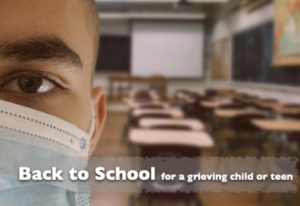As our country mourns the loss of life from two tragic events within only a few weeks, the shock and grief can feel overwhelming. In the wake of the attack on pedestrians in Toronto, trying to make sense of a senseless act stuns and baffles us all. These events present numerous questions and disrupts our sense of safety and security. Despite the helplessness we may feel, children and teens need support from the adults in their lives in order to process what has happened and to feel safe in their world.
For children, in the age of social media, information about such events is often received instantaneously. As a result, parents may not have the opportunity to be the person who begins the discussion about what has happened. There are, however, ways parents and other caring adults can help children to cope with a tragedy involving numerous deaths while providing the reassurance they need to feel safe and secure. Below are some tips for discussing and supporting children and teens in the wake of a mass tragedy.
- Talk with your child about what has happened – Although your child may learn of the event via social media, news alerts or from peers, it is still important to initiate a conversation. Talking about the tragedy can help children understand what has happened and ensure they receive accurate information. It can also help them to cope and regain a sense of safety and security. Although our first instinct may be to try and protect children from horrific occurrences, most children will be exposed to some aspect of the tragedy. Therefore, it is important for parents of children at any age to be prepared to talk about what happened and respond to both their fears and their questions. Tell the truth based on what the known facts are without dwelling on specific details or placing judgement. For very young children, use a calm voice and explain very simply what happened in words your child will understand. For older children, ask them what they already know and be prepared to address misinformation. It can also be helpful to check in with children in the days and weeks that follow to encourage the sharing of feelings and emotions openly and to allow them to express ongoing concerns.
- Listen and be open to their questions- The best way to understand how to help your child cope with a tragic event is to listen. It is important to listen for any misinformation or misconceptions as well as to their feelings about what happened and concerns about their own safety or the safety of those close to them. Invite their questions, answer what you can, factually, and know that it is okay not to have all the answers. If you let your child be your guide, they will help you understand the kind of support they need.
- Offer reassurance of their safety – Tragic events that occur suddenly and randomly cause us all to question the safety of our world. However, it is important to remember that news and social media allow for the communication of events and images that are occurring globally, repeatedly. Explaining to children the rarity of such events within our own community can provide them some comfort. As well, discussing with children the steps you and our community leaders are taking to keep everyone safe can help ease their feelings of vulnerability and anxiety about their own and their families’ safety.
- Limit media exposure as much as possible – With the availability of personal technology, our access to information and images of tragic events is easier than ever. Exposure to news, images and graphic details repeatedly can be disturbing, increase a child’s anxiety and can sometimes have lasting effects. Turning off the TV and shutting down the devices can offer an opportunity to talk, share feelings and offer support.
- Model appropriate expression of feelings and strategies for coping – Children look to the adults in their lives as their role models of how to cope with life’s challenges. As adults, we will struggle with our own feelings of anger, sadness, vulnerability, fear and anxiety in the wake of sudden and random acts of violence and tragedy. It is important to pay attention to the feelings we are having and to ensure our own self-care as we care for our children. If you are feeling and showing signs of extreme anxiety, anger or vulnerability this can increase these feelings in your children. Getting enough rest, eating well and keeping active are all ways we can care for ourselves, as well as our children, when tragic events occur.
- Seek additional support for your child if you have concerns – Although it is not unusual to see some behavioral changes in children in the days that follow a tragic occurrence, if a child is experiencing heightened fear and anxiety, physical symptoms (headaches, stomachaches, changes in appetite) or extreme changes in their mood for an extended period of time or to a marked degree, this may be a sign that they are having difficulty coping. If you have concerns, you should contact a health care professional.
Prepared by The Lighthouse Program




